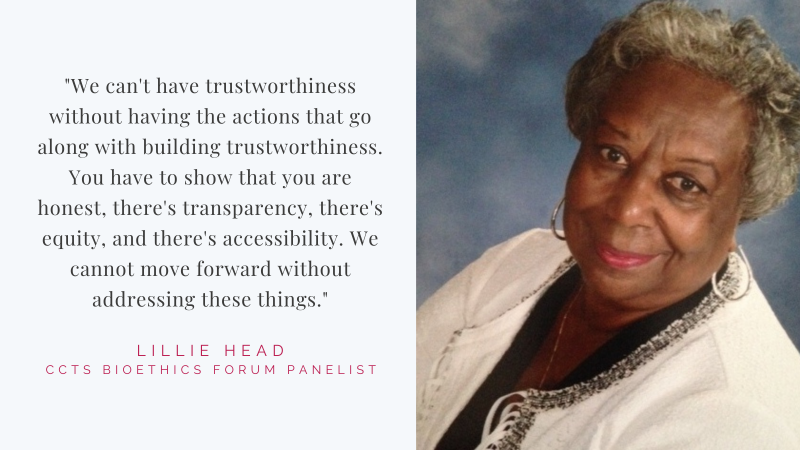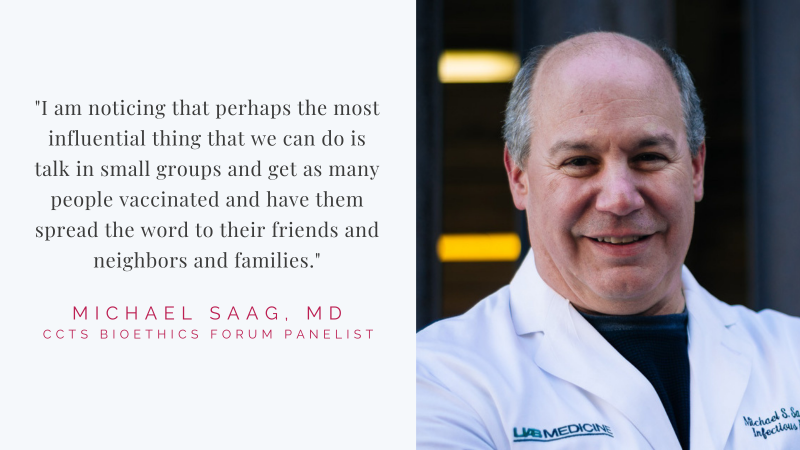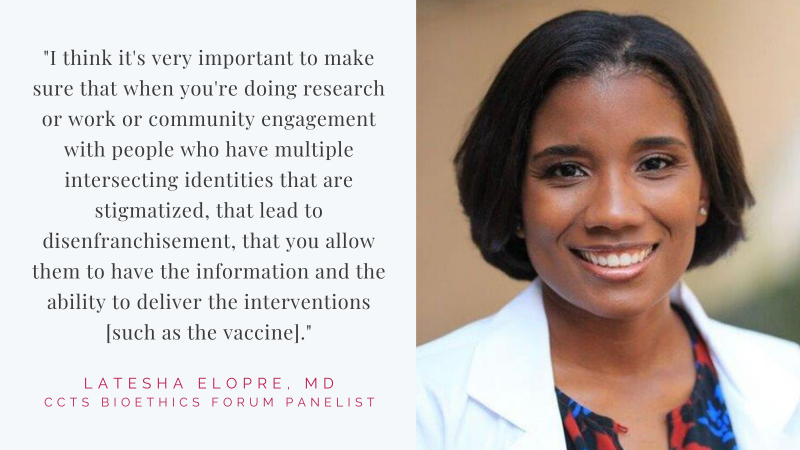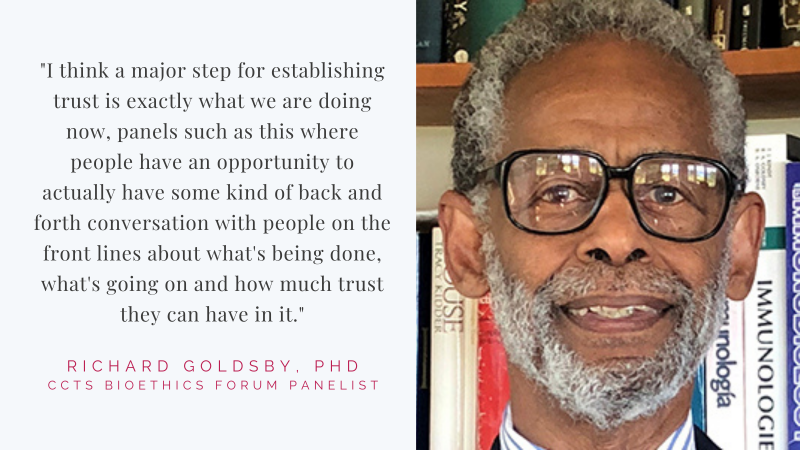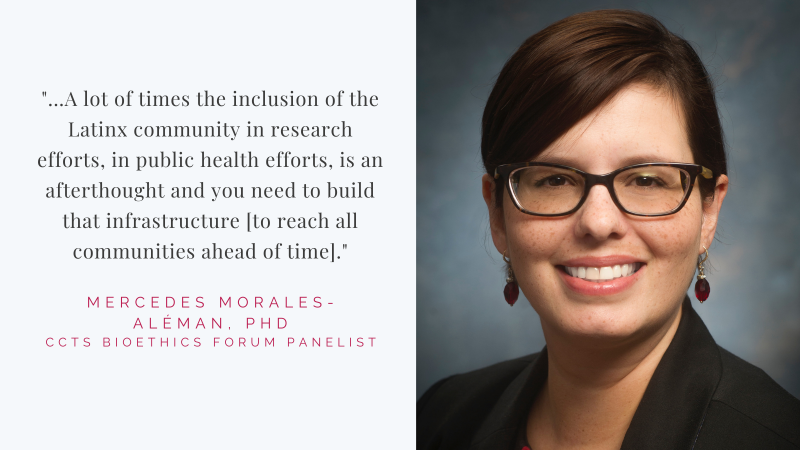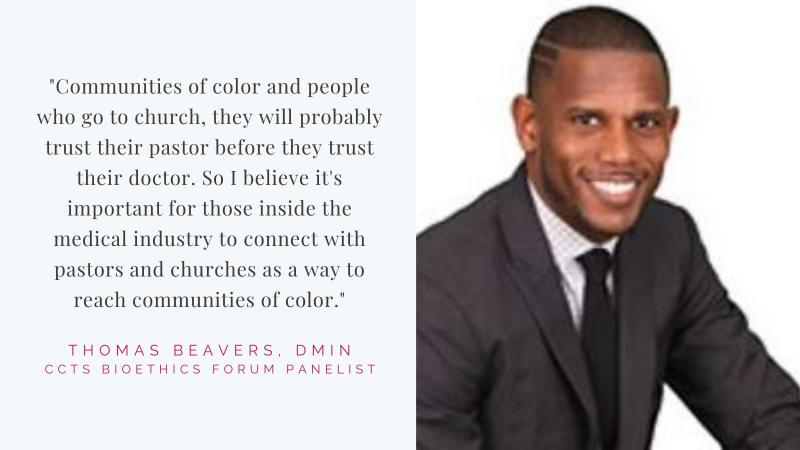Here is the list of CCTS members that are part of TS21. If we missed you in the listing below, please let us know so we can include you, too. Reach out to
TS21 Presenters:
Title: Innovation to Impact - Early-stage Translational Research Programs in Academia
Presenter: Molly Wasko, UAB
Time: 12:15 PM - 1:15 PM CDT on Wednesday, March 31
Title: Prepped for Success: Initiating Collaborations with Statisticians Pre- and Post- COVID
Presenter: Robert Oster, UAB
Time: 11:00 AM - 12:00 PM CDT on Thursday, April 1
Opportunities for translating workforce development strategies across the consortia before, during, and after a pandemic
Presenter: Whitney Bondurant, Leslie Musshafen, University of Mississippi Medical Center
Time: 3:00 PM - 4:00 PM CDT on Wednesday, March 31
TS21 Poster Presenters (CCTS TL1 Trainees):
Phosphorylation state of Myristoylated Alanine-Rich C-Kinase Substrate Effector Domain mimetics determines its cytotoxicity in glioblastoma and macrophage model Poster Presenter: Hasan Alrefai, UAB
Implementation of the Fitness, Lifestyle, and Optimal Wellness (FLOW) Program and Its Associated Health Outcomes Poster Presenter: Daniel Brake, UAB
Assessing Sexual Health Services at a public university in the Deep South Poster Presenter: Andres Camino, UAB
Membrane translocating peptides deliver phalloidin to the cytosol of fibrosarcoma cells Poster Presenter: Ryan Ferrie, Tulane University
Potential effect of serum from hypertensive donors on PP2A expression and activity in endothelial cells Poster Presenter: Dulce Gomez, Auburn University
Synthesis of Novel Core/Shell Polymeric Nanoparticles for Controlled Drug Release Poster Presenter: Braden Hahn, Auburn University
Transitions of Care among Patients with Diabetes in the Deep South: Factors Associated with Hospital Readmissions Poster Presenter: Cassidi McDaniel, Auburn University
Molecular imaging of the tumor microenvironment to predict response to combination treatment with immunotherapy in triple negative breast cancer Poster Presenter: Tiara Napier, UAB
The Signaling Axis of Tumor Suppressor LKB1 in Triple Negative Breast Cancer Poster Presenter: Khoa Nguyen, Tulane University
Multifaceted Risk Profiling for the Hospital Value Based Purchasing Clinical Outcomes Poster Presenter: Jonathan Patterson, UAB
Mothers' and Fathers' Parent-Child Aggression Risk, Intimate Partner Violence, and Perceived Child Behavior Problems Poster Presenter: Doris Pu, UAB
Assessing Transition Outcomes in Sickle Cell Disease (SCD) Prior To Implementation of A Formal Transition Program Poster Presenter: Sydney Sheppard, UAB
Assessing the influence of comorbidities in patients undergoing sternal reconstruction following cardiac surgery: a single institution's 15 year review Presenting Author: Edgar Soto, UAB
TS21 Poster Presenters (CCTS KL2 Scholars):
Understanding Low Adherence to Home-based Exercise Trial among Individuals with Mobility Disability Poster Presenter: Jereme Wilroy, UAB
Bariatric surgery to achieve transplant in end-stage organ disease patients: A systematic review and meta-analysis Poster Presenter: Babak Orandi, UAB
A qualitative study of diabetes distress and coping strategies in adults with type 2 diabetes Poster Presenter: Caroline Presley, UAB
Adverse Childhood Experiences are associated with a higher prevalence of asthma among adolescents with sickle cell disease Poster Presenter: Brandi Pernell, UAB
Metabolomic endotype of bioenergetic dysfunction predicts mortality in critically ill patients with acute respiratory failure Poster Presenter: Raymond Langley, University of South Alabama
Cognitive and Behavioral Outcomes in Adolescents with Sickle Cell Disease Before and After a Telehealth Cognitive Remediation Program to Prepare for Transition of Care Poster Presenter: Donna Murdaugh, UAB
The 2021 CCTS Bioethics Forum, hosted by Tuskegee University and moderated by Stephen Sodeke, PhD, MA, and Faith E. Fletcher, PhD, MA, was held on Friday, March 19th. This year’s event, "Equity and Trust for COVID-19 Testing, Treatment, and Vaccination: Where Do We Go from Here?" featured an esteemed panel of experts who brought diverse perspectives: Mercedes Morales-Aléman, PhD, Thomas Beavers, DMin, Latesha Elopre, MD, Richard Goldsby, PhD, Lillie Head and Michael Saag, MD.
|
In its new, virtual format, the event reached an international audience across 10+ states, with nearly 200 individuals from across fields, ranging from healthcare, community-based and non-profit organizations, cancer research, departments of health, the Centers for Disease Control and Prevention (CDC), and more.
Dr. Stephen Sodeke, Resident Bioethicist at the Center for Biomedical Research and Professor of Bioethics in the College of Arts and Sciences, Department of Modern Languages, Communication, and Philosophy at Tuskegee University, opened the event with a reflection on the past year of the COVID-19 pandemic and an observation of silence in memory of the many lives lost to the infection.
|
“The CCTS Bioethics Forum on COVID-19 was a powerful and needed presentation. The expert panelists were very open, honest, and engaging. Their work and experience displayed the perfect description of how to best serve and care for patients and people responsibly. It is by merging the scientific knowledge of professionals, and scientists, with the experience of community organizers and leaders for the sake of humanity. It also requires having a willingness to work in truth, respect and dignity which they all displayed.” - Kimberly Robinson, LBSW, Coordinator of Health Education/Patient Navigator, UAB Comprehensive Cancer Center
The new cohort includes trainees from Auburn University, Tulane University, University of South Alabama, and University of Alabama at Birmingham.

University of Alabama at Birmingham
College of Arts and Sciences | Psychology
Fun Fact: She competed at the Junior Olympics for swimming.

University of Alabama at Birmingham
School of Medicine | Medicine
Fun Fact: He can speak three languages and would like to learn three more by time he turns 30.

University of Alabama at Birmingham
School of Medicine | Anesthesiology
Fun Fact: He has survived a sky diving accident and brews his own beer.

University of Alabama at Birmingham
Graduate School | Medicine
Fun Fact: My life-size picture is on a mural at a popular restaurant near my undergrad university.

Tulane University
School of Medicine | Hematology and Oncology
Fun Fact: Her hobby is pottery, and she has a cat named Goose.

University of Alabama at Birmingham
Graduate School of Biomedical Sciences | Medicine
Fun Fact: Her favorite sport is golf.

University of Alabama at Birmingham
School of Medicine | Otolaryngology
Fun Fact: She loves to travel and has been to five continents and over 30 countries. She has lived in Costa Rica as a sea turtle conservation worker and in Poland as a Fulbright recipient.

University of Alabama at Birmingham
College of Arts and Sciences | Biology
Fun Fact: He bungee jumped off of a bridge in Costa Rica once.

University of Alabama at Birmingham
School of Health Professions | Health Services Administration
Fun Fact: She loves singing solo or with a choir as a soprano and also plays the violin.

Tulane University
School of Science and Engineering | Bioinnovation
Fun Fact: She has an identical twin sister.

University of Alabama at Birmingham
School of Medicine | Medicine
Fun Fact: She loves reading books and speaking Spanish.

Auburn University
College of Human Sciences | Nutrition, Dietetics, and Hospitality Management
Fun Fact: Her ideal morning is watching the sunrise with a bagel sandwich and a cup of coffee.

University of Alabama at Birmingham
School of Medicine | Dermatology
Fun Fact: She loves to travel, and her most recent adventure involved swimming between two glaciers and chasing northern lights in Iceland.

University of South Alabama
College of Medicine | Physiology and Cell Biology
Fun Fact: In his free time he enjoys wood working and playing soccer.

Tulane University
School of Medicine | Hematology and Oncology, Medicine
Fun Fact: When she was a kid she collected the 50 state commemorative quarters.
The 2021 CCTS Bioethics Forum panelists have diverse backgrounds and interests that will bring a range of perspectives to this annual forum. Learn more about the panelists below and register for the virtual event here.
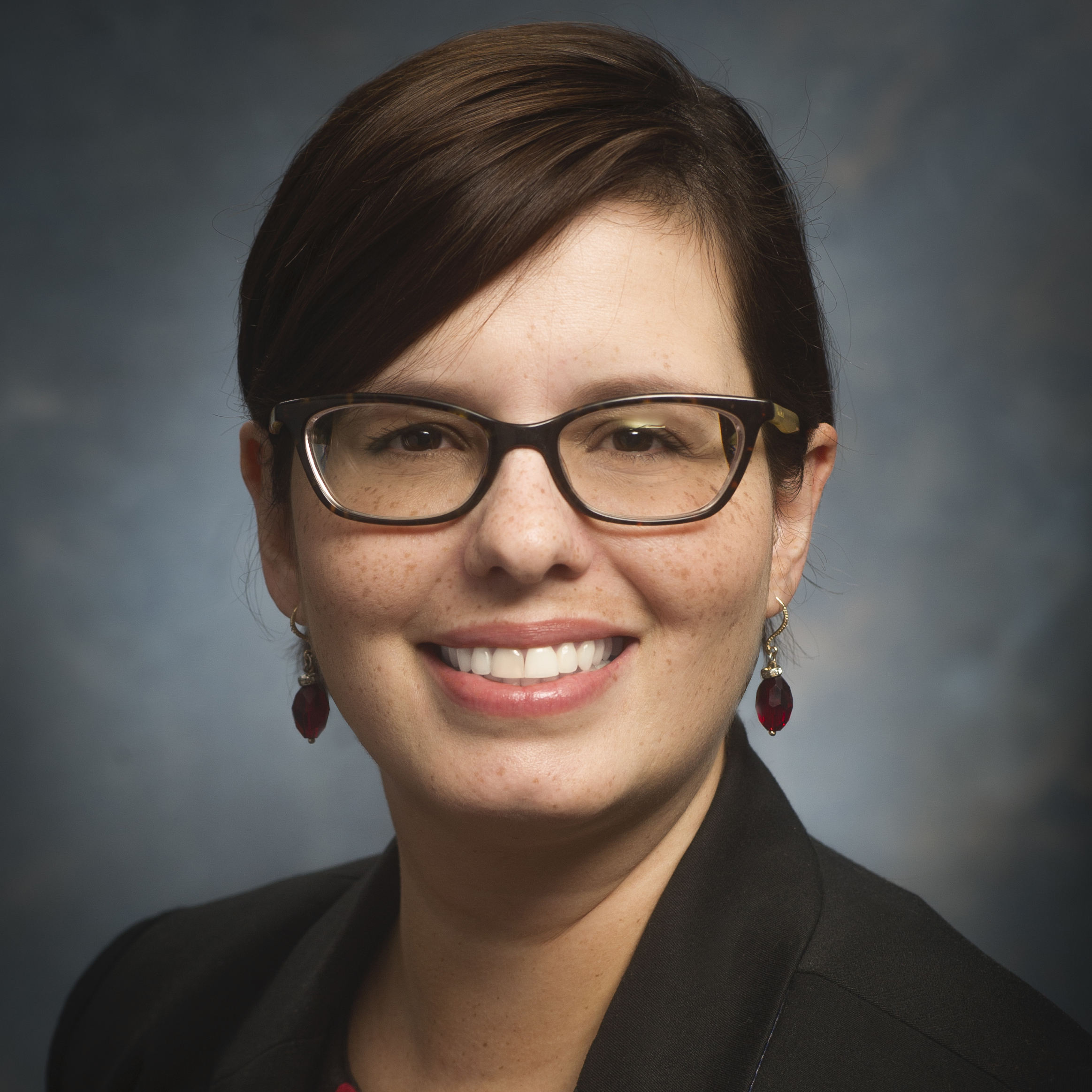
Department of Community Medicine and Population Health | University of Alabama
Background: Graduate of the University of Puerto Rico-Mayaguez and Michigan State University.
Fun Fact: She serves as the chair of the College of Community Health Sciences Committee for Academic Diversity and Inclusion.
Research Focus: Sexual health and health care access among ethnic minority women in the US South.

New Rising Star Missionary Baptist Church
Background: Graduate of Kentucky State University and Beeson Divinity School of Samford University
Fun Fact: He succeeded his grandfather, who served as the pastor of his church for 35 years.
Ministry Focus: Efforts that impact the community in education, financial literacy, workforce development, housing, and recreation as well as developing a better quality of life on earth.
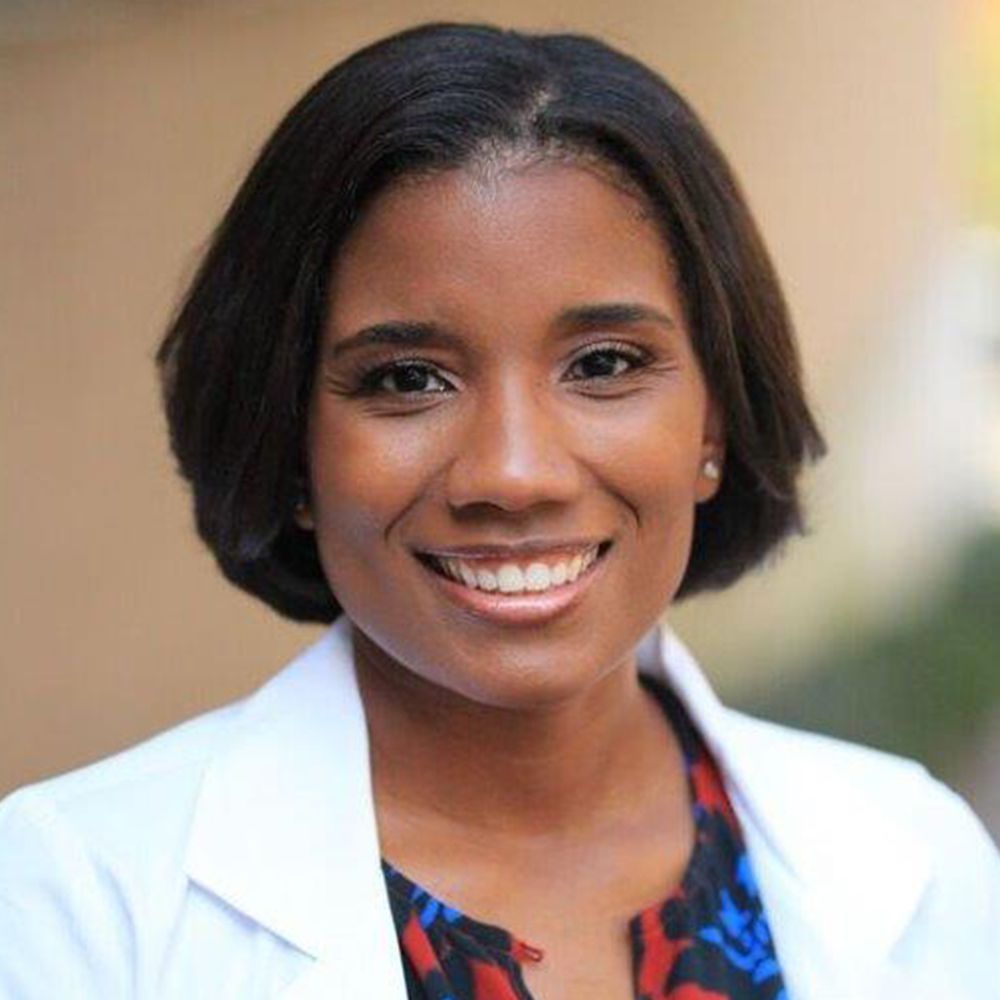
Assistant Professor of Medicine | University of Alabama at Birmingham
Background: Graduate of the University of Florida. She then underwent Internal Medicine Residency and Infectious Diseases’ Fellowship training at the University of Alabama at Birmingham. During this time, she also received her MSPH in Applied Epidemiology.
Fun Fact: She has won both the Dean’s Excellence Award in Diversity and the Unsung Hero Award at UAB.
Research Focus: Social determinants of health for STDs, including HIV.
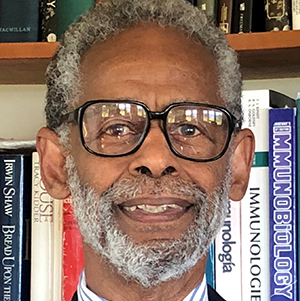
Biology | Amherst College
Background: Graduate of the University of California, Berkeley and has served as professor of biology at Amherst College since 1982.
Fun Fact: He has an interest in the biology of race, which arose from efforts to understand the biological roots of the debates about a relationship between race and behavior and has published work on the subject.
Research Focus: He is an immunologist, interested in the cellular and molecular biology of the immune response.

Voices for our Fathers
Background: Lillie Head’s father, Freddie Lee Tyson, is one of more than 600 men who were enrolled in the Tuskegee Institute Syphilis Study. She founded Voices for our Fathers as a way to connect other relatives of the study’s victims across generations, to provide annual scholarships to descendants of participants, and to participate in the Research Project: “The Untold Story”.
Fun Fact: She leads efforts to offer support and guidance to the Tuskegee University National Center for Bioethics in Research and Health Care, while pursuing all other strategic plans.
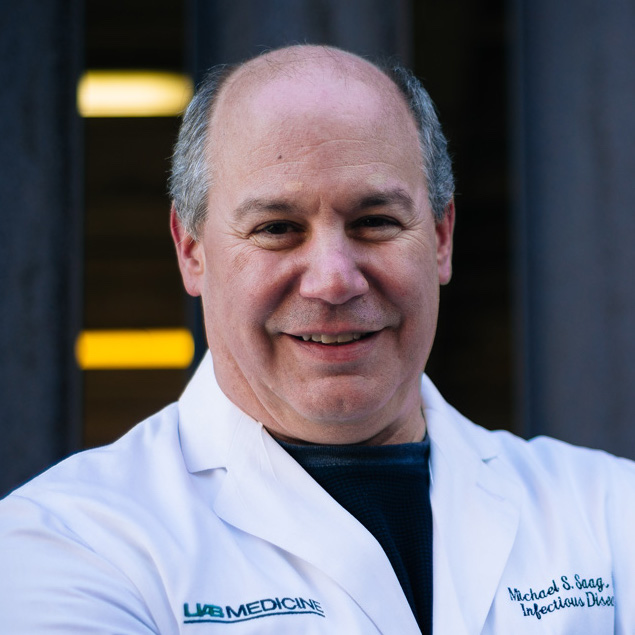
Infectious Disease | University of Alabama at Birmingham
Background: Graduate of Tulane University and the University of Louisville. He completed his residency and infectious disease and molecular virology fellowship training at the University of Alabama at Birmingham.
Fun Fact: Founded the 1917 Clinic, a comprehensive AIDS treatment and research center at UAB, more than 30 years ago.
Research Focus: HIV/AIDS infection control, Antiretroviral therapy, HIV/AIDS research, and Hepatitis C diagnosis and therapy.

Select a menu item to learn more about the efforts that took place over the course of the year.

-
2020 Highlights: Partner Network
Below are just a few of the ways the Partner Network helped move the needle for the CCTS in 2020.
- The Partner Network worked closely together, continuing collaboration and strategy through virtual versions of their Executive Committee meetings, monthly Partner Teleconferences, and Internal and External Advisory Committee meetings.
- The CCTS investigators from across the Partner Network continued to catalyze discovery to address chronic disease and health disparities in a variety of CCTS award programs, including the Therapeutic Advancement Initiative, the CCTS Interdisciplinary Network Pilot Program, the Deep South Mentored Career Development Program (KL2), and the Predoctoral Clinical/Translational Research Program (TL1).
- The move to virtual trainings, meetings and programs made gatherings more accessible for the entire Partner Network. This shift allowed even more partner interaction and camaraderie as we continued to build a community of scholars.
- Population genomics research is an area where partnership really shined in 2020. Our region includes populations that are saddled with a high burden of chronic, life-threatening diseases such as obesity, diabetes, hypertension, and cancer. The CCTS has four major population genomics initiatives underway, all working to offer solutions to chronic disease. This portfolio set the stage for even greater success with new program grants to advance Precision Animal Modeling (C-PAM), participation in the eMERGE Network and genomic medicine in pediatrics (BabySeq2).
-
2020 Highlights: Training Academy
This year called for innovation and perseverance in the conduct of CCTS Training Academy initiatives like never before. Below you’ll find a few highlights from this year:
- With digital engagement already a tenet of the Training Academy, the pandemic pivot to virtual training was swift and without interruption, and attendance for virtual trainings has been robust. Programs included the Specific Aims Intensive and the Grant Proposal Development Academy.
- The Driving Research: An Interdisciplinary, Vibrant, Engaged Network (DRIVEN) program continued to support a diverse cohort of scholars actively engaged in research and career development activities. DRIVEN experienced a 167% increase in membership and shepherded three Research Supplements to Promote Diversity in Health-Related Research (in Medicine, Nutrition Science and Public Health).
- The Predoctoral Clinical/Translational Research Program (TL1) has significantly grown in diversity of the institutions, disciplines, gender, race and ethnicity represented in the training cohort. In 2020, eight of the 15 selectees represented Partner Institutions, up from five the previous year.
- In February, the 5th Annual CCTS Bioethics Forum hosted record-breaking attendance and covered Engagement of Diverse Populations in Research: Challenges & Lessons Learned from Cohort Studies.
- The 2020 Clinical and Translational Science Training Program (CTSTP) welcomed the largest cohort seen to date!
-
2020 Highlights: Special Modules
The purpose of CCTS Special Modules is to help clinical and translational investigators connect with and leverage expertise and unique capacities found within the CCTS Partner Network. Here is a snapshot of the progress made in this domain in 2020.
- The Undiagnosed Diseases Program (UDP) continued its mission to evaluate patients with chronic, undiagnosed diseases and providing access to whole exome and whole genome DNA sequencing in order to identify potential therapeutic targets which can serve as a pipeline to therapeutic discovery. UDP has an ~ 40% rate of diagnoses, with all patients seen having undergone previous extensive workups that failed to achieve a diagnosis. One 2020 diagnosis resulted in expanding the phenotype of a rare form of progressive neuromuscular disease diagnosed in a UDP patient.
- The Hub was recently awarded an NIH-sponsored Center for Precision Animal Modeling (C-PAM), one of three in the country. The C-PAM seeks to analyze sequence variants efficiently and cost-effectively to pursue disease mechanisms and targeted therapeutics. It does so by creating a portal for genomic medicine-enabled projects (e.g., via UDP) leading to the development of computational and animal models for further experimentation to understand biologic impact of genetic variants, in part, by CCTS Partner Network investigators.
- The CCTS Partner Network experimented with a new assay development model, inviting investigator-initiated projects seeking to develop and/or refine an experimental platform –model, reagent, assay, etc. – to accelerate the progression of promising therapeutics along the translational pipeline towards clinical applications and ultimately health impact. Through this CCTS Therapeutic Advancement Initiative (TAI), investigators established novel high-throughput screening platforms, developed organoid methods to assay drug analogs, and demonstrated effectiveness of potential interventions in preclinical models of transplant, multi-organ failure and acute lung injury.
- The All of Us Research Program opened the Researcher Workbench beta version and is inviting researchers to apply for access and to explore the initial dataset and tools. The new Researcher Workbench is a secure, cloud-based platform that offers researchers an opportunity to execute rapid, hypothesis-driven research and build new methods for the future.
- The Alabama Genomics Health Initiative (AGHI) set the stage in 2020 to embedded enrollment into Family Medicine clinical practice in 2021 in Birmingham, Hoover, and Selma, Alabama, setting the stage for precision care that is better-informed and more cost-effective.
-
2020 Highlights: Clinical Translation
Over the past year, the Clinical Translation Domain kept clinical studies moving forward. Below are just a few of the ways Clinical Translation helped move the needing for health in 2020.
Clinical Trials- Despite the effects of the modified business model due to the COVID-19 pandemic, clinical trial expenditures at the CCTS Hub (UAB) continued to grow by an average of 16% year-over-year. In 2020, this growth enabled advances such as device testing in structural heart and lung diseases, novel therapies for advanced solid tumors, new interventions for mental health conditions, neurologic diseases, genetic disorders, and more!
- The CCTS launched our first clinical trials investigator podcast, CITP on the Go, allowing busy investigators to connect with the CCTS Clinical Investigator Training Program and expert presenters, at their convenience and at their own pace.
- The newly refined CCTS Clinical Trials Kiosk now contains even more resources, budget tools, source documents, templates, and more for clinical trials investigators, all in one handy place. Additionally, the Clinical Research Support Program (CRSP) team helped created a new onboarding resource for those investigators new to UAB clinical research.
- The CCTS Bionutrition Unit has helped facilitate numerous feeding studies with a wide range of dietary requirements. Most recently, supported research includes studies on the ketogenic diet, DASH diet, and diets controlled for specific nutrients such as phosphorus, oxalate and sodium. Facilities, research experience, and trained staff put the Bionutrition team in an unique position to support future research in the new and upcoming area of Precision Nutrition, which promotes an individualized approach to nutrition and diet based on various metabolic, genetic, behavioral, and environmental factors.
- As the pandemic halted many business operations, and departments pivoted to a virtual format, the Clinical Research Unit (CRU) remained open and steadfast. Construction has begun on a planned facility expansion to enable the CRU to accommodate more studies requiring extended stays.
-
2020 Highlights: Engagement of Communities
The Community Health Innovation Awards call for innovation (it’s in the name, right?), and what could make innovation even more critical than when your organization lands grant funding right before a pandemic hits? We’ve checked in on all five CHIA recipients to see how they’ve fared since COVID-19 took its hold, and here are a few updates.
Chocolate Milk Mommies (Lindsey Rice, Project Director)
Mission: Chocolate Milk Mommies (CMM) is a parenting group working to remove the stigma surrounding breastfeeding—especially in public—in black communities.
Project Updates:- Continued their in-home counseling by purchasing a HIPPA-compliant virtual platform for ‘visits’
- Used their resources to distribute COVID-19 relief packages that included masks, hand sanitizer and health information
- Received additional funding ($10K) from the Community Foundation of Birmingham, and is exploring expansion of their efforts into Tuscaloosa and Mobile, Alabama
- Has grown their reach on social media, and now hosts over 1,200 people in their Facebook support group
Mission: Link and Lease/Druid Hills Alliance exists to create a Birmingham where everyone has a place they can call home, by working with housing insecure individuals who deserve an opportunity for fair housing.
Project updates:- Continues renovating two homes in a historic neighborhood in Birmingham, Alabama, creating pathways for home ownership for underrepresented communities
- Identified a piece of property in Druid Hills that will serve as a local restaurant, which will be the only establishment in the area not associated with the Birmingham, Alabama “Uptown” area. This effort to address the food insecurity in the neighborhood was led with the community in mind, making selection decisions.
Mission: Offender Alumni Association is dedicated to its mission to empower former offenders and their family members to actively engage in reducing crime and restoring communities.
Project Updates:- Pivoted seamlessly to online sessions with program participants
- Received a $20,000 donation from United Way Worldwide
- Secured an additional pledge to the program from an anonymous donor and developed a new partnership with B & C Development to assist with a 6-week introductory carpentry class for program participants
- Partnered with UAB Criminal Justice undergraduate student to create a tutoring program with the members of Offender Alumni Association
Mission: GASP is a health advocacy organization with a mission to advance healthy air and environmental justice in Birmingham
Project Updates:- 25 total air quality sensors have been built, working in partnership with a local group of engineers and designers, and 14 are up and running
- A 1,500+ acre community park in the city of Birmingham has agreed to use their tract of land to install two more sensors
Mission: Youth Talk United provides mentoring, young adult leadership, parent involvement and sports, all as part of its mission to continue to empower and inspire the community.
Project Updates:- Zoom has actually allowed more freedom with members talking and being more comfortable in sharing personal challenges
- The Community Foundation of Birmingham provided a grant to Youth Talk to address mental health concerns during the pandemic
- Youth Talk United connected with the Birmingham City Council to create volunteer opportunities for the youth they serve
- Leadership has connected with a local McDonald’s to provide jobs for any participants of Youth Talk United at any McDonald’s location in the Birmingham metro area
-
2020 Highlights: Research Commons
In a year that started out like any other and quickly forced a shift to new, innovative, and often challenging means of conducting research, the CCTS experienced many successes of note. The following accomplishments couldn’t have come to fruition were it not for the dedication of the individuals and teams that make up CCTS Research Commons. While there are many highlights from this year, below are a few notable accomplishments:
- CCTS research partnerships resulted in $39M new programmatic awards and an additional $5.8M to support COVID investigation.
- CCTS added 650 new members from across the tri-state Partner Network.
- The CCTS was among the first four institutions to join and send data to the National COVID Cohort Collaborative (N3C), a large data enclave that currently integrates 2.6B rows of data on 2.5M patients across 36 sites to gain crucial insights into population health.
- Informatics for Integrating Biology and the Bedside (i2b2) was leveraged by 244 unique investigators for their projects through 64,963 user sessions and resulting in over 600 limited data set downloads.
- CCTS Informatics expanded i2b2 to include 7.1B observations across 1.6M concepts on 1.56M patients.
- CCTS BERD consultations adapted seamlessly to the virtual format, providing scientific design and analytic expertise to 295 researchers on over 350 research projects.
- Kaizen-R2T, the self-directed training in Rigor, Reproducibility and Transparency, launched its first international game this year and hosted 204 participants from 29 institutions.
- Over $3.1 million was awarded to the CCTS to help extend the reach of the I-Corps@NCATS program nationally over the next three years and to engage entrepreneurial teams with game-changing biomedical applications that may improve health.
- The Southeast Health Alliance for Research (SHARe) continued to support multi-site clinical investigation, identifying study team personnel and recruiting affiliate sites for on-going and new studies, including pivotal COVID treatment trials.
- Shifting to a virtual format, the CCTS conducted more than 152 panels, helping investigators and trainees create more competitive proposals through expert peer review.
- CCTS Pilot awardees overcame pandemic-related delays and challenges to advance critical discovery research in cardiac care, neurovascular function, novel diagnostics, age-related cell instability, health disparities, diabetes risk and breast cancer.
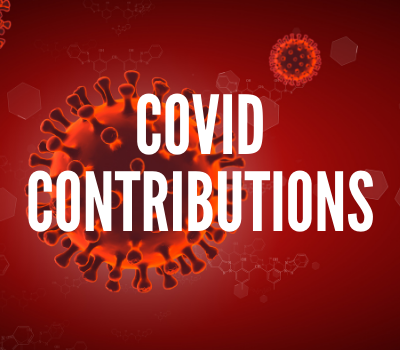
-
Covid Contributions: Partner Network
The CCTS Partner Network connects investigators across the Deep South through collaborative research and training efforts. This collaboration was at the forefront of CCTS COVID-19 research and response efforts over the past year.
- The CCTS Southern Commonweal is a platform to exchange ideas and successful strategies in the engagement of communities that spans the Partner Network. Early on in the pandemic, the Mississippi Department of Health launched a community survey to help understand community trust of COVID-19 information, and this work led to a rapid mobilization to provide information to vulnerable communities to reduce the stigma around COVID-19. The strategies to achieve this outreach were disseminated regionally via Southern Commonweal in an effort to inform and to facilitate similar initiatives across the region.
- The NIH Community Engagement Alliance (CEAL) Against COVID-19 Disparities program supports teams in 11 states, including CCTS Partners in Alabama, Louisiana, and Mississippi. CEAL leverages the Southern Commonweal for sharing of successful strategies in engagement.
- Despite the social distancing required over the last year, researchers within the CCTS Partner Network were able to come together through new and evolving collaborative supports. The National COVID-19 Cohort Collaborative (N3C), which launched in early summer, created a secure, central database of electronic health records from coronavirus patients and the All of Us Research Workbench allows the sharing of large data sets.
-
COVID Contributions: Training Academy
Take a look at a few of the ways the Training Academy thrived despite the COVID-19 outbreak.
- In the early spring, the Training Academy quickly realized a need for orientation resources to help investigators acclimate to virtual teamwork and to continue to excel in their research from a distance. Through partnerships with experts within our Partner Network, we were able to offer a range of trainings from time management to “How to Thrive in a Virtual World,” to meet this need.
- CCTS Training leaders played a critical leadership role in nurturing bidirectional conversations and critical perspective-sharing surrounding COVID-19 misinformation and mistrust, testing, therapeutics, and vaccinations. In partnership and synergy with RADx-UP and CEAL initiatives within Alabama and across the region, CCTS investigators and Training Academy alumni supported research and outreach efforts to impact the populations we serve.
- The CCTS, through its Training Academy, facilitated multiple discussion venues, including “Morning Coffees”, “Afternoon Teas” and CCTS Forums, to engage teams to share the latest operational guidelines for conducting research in a quickly evolving pandemic-affected landscape.
-
Covid Contributions: Special Modules
The CCTS Special Modules Domain has supported and facilitated many efforts toward understanding and responding to the COVID-19 pandemic.
- COVNET: Large-scale Genome-wide Association Study and Whole Genome Sequencing of COVID-19 Severity: This international effort, organized by the NIH, utilizes a “crowdsourcing” approach to accrue samples from multiple centers throughout the U.S. and Canada, including CCTS Partner Institutions LSU and UAB. The aim of COVNET is to genotype DNA from upwards of 40,000 COVID-19 positive individuals to investigate both common and rare variants associated with differences in disease outcome using a case-case design.
- Investigators at CCTS Partner Institutions Louisiana State University, University of South Alabama, and University of Alabama at Birmingham have assembled the expertise, biosafety measures and technology in viral sequencing to help further the efforts for understanding COVID-19 infection, made all the more imperative in light of novel SARS-CoV-2 variants.
- Work by Richard Whitley, MD, UAB Professor and Co-Lead of the CCTS’s Drug Discovery initiative, and others came to center stage as the drug, Remdesivir, previously developed as a treatment for MERS, was identified as an effective intervention in managing COVID-19 infection.
-
Covid Contributions: Clinical Translation
Here are a few of the ways the Clinical Translation domain contributed to important COVID-19 research efforts.
- The CCTS collaborated on a national seroprevalence study to understand COVID-19 herd immunity in the United States. The study went from concept to full approval in a matter of weeks, enrolling 10,000 study volunteers just weeks later, testifying to the power of teamwork that is central to the CCTS’ mission.
- The CCTS Specimen Processing and Biorepository Unit (SPAN) offers specialized support for the entire continuum of research specimen-associated needs, and the burden of additional COVID-19 processing was met with an incredible tenacity. The SPAN team partnered with the Alabama Vaccine Research Clinic, Pathology & Microbiology Departments, CFAR Clinical Core, and others to support the COVID-19 Enterprise Biorepository, which manages a variety of biospecimens from over 1700 participants.
- The Child Health Research Unit (CHRU) continued to support dozens of pediatric clinical studies despite pandemic limitations, setting the stage for critical investigation of the youth impact, treatment and prevention of COVID-19.
- The Clinical Research Support Team (CRSP) had the privilege of being asked to help provide phlebotomy and nurse coordinators for the Moderna COVID-19 vaccine trial at St. Vincent’s Hospital in Birmingham, Alabama. The CRSP team formed new relationships, followed good clinical practice, and furthered an important trial that impacts our communities.
- The CCTS, through efforts at the Hub (UAB) as well as across the Partner Network, has been deeply involved in the COVID-19 pandemic response from both the treatment and prevention (vaccine) fronts. These efforts have included, but are not limited to, the implementation of the ACTIV (Accelerating COVID-19 Therapeutic Interventions & Vaccines) protocols coordinated by the NIH at SHARe sites such as Tulane University and Ochsner Health, in addition to a myriad of outpatient and inpatient convalescent plasma trials coordinated by Johns Hopkins University through the Trial Innovation Network (TIN). So far, hundreds of patients have participated in dozens of trials just at the Hub, with enrollment ongoing for many.
-
Covid Contributions: Engagement of Communities
COVID-19 brought together many communities and stakeholders to battle the novel coronavirus. Here are just a few snippets from efforts that came together rapidly.
- In April and May of 2020, the UAB School of Public Health and CCTS Engagement of Communities Domain, with local churches and community stakeholders, organized three public, virtual events addressing the impact of COVID-19 on communities. These events, “COVID-19 Impact on the Black Community,” “COVID-19’s Impact on Women,” and “COVID-19’s Impact on Food and Shelter Inequality,” were moderated by Drs. Shauntice Allen and Faith Fletcher, and offered an opportunity for community members to ask questions and hear directly from the experts, during a time when information about the disease was still very limited. This successful series, with livestreams exceeding 53,000 views, was featured in the December 2020 issue of Insight into Diversity.
- Community Engagement Alliance Against COVID-19 Disparities (CEAL) Researchers across the CCTS are part of a National Institutes of Health-funded effort for outreach and engagement efforts in ethnic and racial minority communities disproportionately affected by the COVID-19 pandemic. This effort is chiefly designed to overcome scientific mistrust, to address COVID-19 misunderstanding and to bolster diverse participation in clinical investigation. The NIH CEAL program supports teams in 11 states, three of which are in the CCTS Partner Network. CEAL leverages the Southern Commonweal for sharing of successful strategies in engagement.
- CCTS investigators joined leaders in the UAB Center for AIDS Research and the Minority Health and Health Disparities Research Center as part of the NIH RADx-UP programto support projects designed to rapidly implement COVID-19 testing strategies in populations disproportionately affected by the pandemic.
-
Covid Contributions: Research Commons
The CCTS is grounded in the power of collaboration, and when it came time to battle the virus that causes COVID-19, a coordinated effort was even more essential.
The COVID-19 Enterprise Research Initiative, was mobilized just weeks after the pandemic was declared, and it continues to shepherd the safe and efficient consent process and collection of specimens and clinical data. CCTS Informatics, with leadership by the Center for Outcomes & Effectiveness Research, Informatics Institute and multiple schools, continue to coordinate clinical data and longitudinal follow-up for rigorous secondary analysis that ensures efficient and respectful engagement of research participants. The effort has shown how much more can be accomplished when everyone comes to the table.
The COVID-19 Enterprise Biorepository team has worked hard to support COVID-19 research, and nearly 1,800 individuals have consented to be part. The biorepository has been especially impressive in its enabling of:- Recruitment of individuals with current or previous infection or symptoms from both hospitalized and ambulatory settings (or autopsy)
- Collection of a variety of specimen types, including new and/or remnant blood; tissue; oral (cheek, throat)-, nasal-, nasopharyngeal-, vaginal-, rectal- swabs; endotracheal aspirates; urine; saliva; etc.
- Linkage of specimens to clinical information in the electronic health record, external sources (e.g., health claims data, death index) as well as the collection of data through surveys and other PRO-instruments
- Recall of participants for longitudinal follow-up and provision of additional specimens
- Specimen and data sharing for multi-site investigation, including genetic studies

